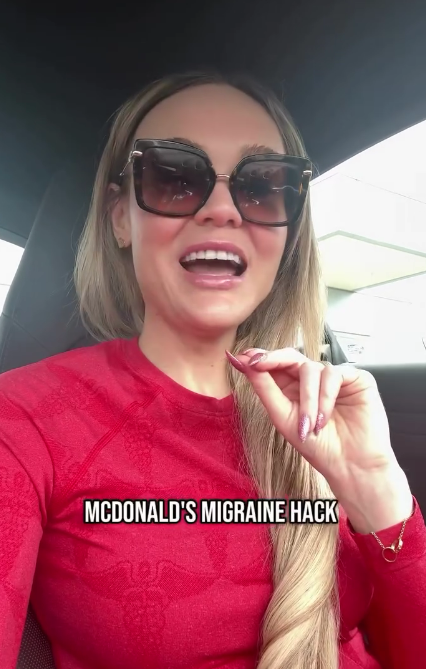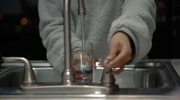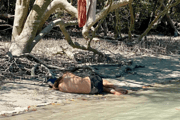
We've all been there—that familiar throbbing pain starts creeping in just as you're miles from home without your usual migraine medication.
For the 4.9 million Australians living with migraines, this scenario is all too familiar. But what if the golden arches could offer unexpected relief?
A neurologist's unconventional advice has caught the attention of migraine sufferers across the country, and it involves nothing more complicated than a trip to McDonald's.
The 'McMigraine' phenomenon explained
Dr Jessica Lowe, a neurologist, has dubbed her unusual remedy 'the McMigraine' - a simple combination of Coke and fries from McDonald's that costs just $7.15.
While it might sound like an excuse for fast food, there's actually solid science behind this surprising solution.
'The idea is that this combo—caffeine, salt, and sugar/carbs—can help relieve early migraine symptoms. It's not a cure or a substitute for proper treatment, but when you're caught without medication, it might just take the edge off.'
The magic lies in the combination of three key ingredients working together. The caffeine in Coke constricts dilated blood vessels, which is one of the key mechanisms causing migraine pain—that's why caffeine is an active ingredient in many over-the-counter and prescription migraine medications.
The staggering scale of migraine in Australia
The numbers are truly eye-opening. According to Deloitte Access Economics, 4.9 million Australians live with migraine, with 71 per cent being women and 86 per cent of working age. Even more concerning, the total economic cost of migraine in Australia reaches $35.7 billion annually.
Australian migraine statistics
4.9 million Australians affected (20.55 per cent of population)
400,000 experience chronic migraine (≥15 days per month)
$35.7 billion annual economic cost
13,948 Australians currently receive Disability Support Pension with migraine listed
For those over 60, there's some encouraging news. Research shows that migraines tend to disappear with age—by age 70, only 10 per cent of women and 5 per cent of men experience them. However, this doesn't mean the problem goes away entirely, and for those still suffering, affordable relief options remain crucial.
The caffeine paradox—friend or foe?
Here's where things get interesting—and a bit complicated. Caffeine has been linked with migraine for many years, both as a trigger and as a cure. This dual nature can be confusing, but understanding it is key to using remedies like the McMigraine safely.
Professor Beata Bajorek from the Hunter Medical Research Institute explains that caffeine can trigger headaches in people who don't regularly consume it, and equally, sudden withdrawal after regular consumption can also trigger migraines.
Did you know?
Did you know?
Recent research from 2016 found that migraine patients who completely discontinued their daily caffeine intake had significantly better results from their acute migraine treatments compared to those who continued consuming caffeine regularly.
The American Migraine Foundation warns that caffeine taken three or more days per week may lead to dependency and increased migraine frequency, and for those with frequent headaches, complete caffeine avoidance is ideal.
Why the McDonald's trick works (sometimes)
The effectiveness comes down to the perfect storm of ingredients. Combining caffeine with simple analgesics can help treat headaches or migraines, particularly in those who regularly consume caffeine or are experiencing withdrawal.
The salt from the fries may help correct electrolyte imbalances, while the sugar and carbohydrates can stabilise blood sugar levels that often drop before or during a migraine. There's also a psychological comfort element that shouldn't be underestimated.
Important considerations for older Australians
While the McMigraine might work in a pinch, it's particularly important for those over 60 to consider the health implications. Migraine sufferers should be aware of their caffeine consumption and not exceed 200mg daily, keeping their intake as consistent as possible to avoid withdrawal headaches.
For seniors managing other health conditions like diabetes, high blood pressure, or heart problems, the high sugar and salt content of this remedy could be problematic. It's always worth discussing such strategies with your GP or specialist.
Healthier alternatives that work just as well
Carl Cincinnato from Migraine & Headache Australia suggests several healthier options that can provide similar relief without the fast-food concerns:
Better alternatives to the McMigraine
- Oral rehydration solutions (without high sugar content)
- Tea with Vegemite on toast (caffeine, salt, and carbs)
- Electrolyte drinks with small amounts of caffeine
- Ginger tea for nausea relief
- Cold compress on forehead or neck
The key is combining caffeine with simple analgesics like paracetamol, aspirin, or ibuprofen, which helps moderate changes in blood flow while addressing the pain directly.
When to use and when to avoid
The American Migraine Foundation recommends limiting acute caffeine treatment to no more than two days per week. This means the McMigraine should truly be reserved for emergencies when you're caught without your usual medication.
The remedy won't work for everyone. Up to 30 per cent of migraine sufferers report caffeine as a trigger rather than a treatment, so if you're caffeine-sensitive, this approach could make things worse.
It's also worth noting that Dr Lowe specifically recommends regular Coke over Coke Zero, as the artificial sweeteners in diet drinks can actually trigger migraines in some people, and the glucose hit from regular sugar is part of what makes this remedy potentially effective.
The bigger picture on migraine management
While quick fixes like the McMigraine can be lifesavers, they're not long-term solutions. The good news is that there are now eight different CGRP blockers approved for migraine treatment, and the American Headache Society recently declared these should be considered first-line treatments.
For those dealing with regular migraines, lifestyle factors remain crucial. Proper sleep, regular exercise, staying hydrated, and managing stress all play significant roles in preventing attacks. Complementary treatments such as biofeedback, green light therapy, and aerobic exercise are also worth exploring.
The bottom line
The McMigraine trick isn't just a social media trend—it's based on sound physiological principles that have helped many Australians when caught without their usual medication. However, like any health remedy, it comes with important caveats.
For those over 60, it's particularly important to weigh the benefits against potential health risks, especially if you're managing other conditions.
The good news is that there are healthier alternatives that work on the same principles without the fast-food concerns.
Whether you choose the original McMigraine or opt for tea and Vegemite toast, the key is having a plan for those unexpected migraine moments. And remember, if you're experiencing regular migraines, it's worth having a conversation with your healthcare provider about more comprehensive treatment options.
Have you tried the McMigraine trick, or do you have your own emergency migraine remedy that works? We'd love to hear about your experiences and what strategies have helped you manage those unexpected attacks.
Credit: Instagram
Original Article
https://au.lifestyle.yahoo.com/doct...es-plaguing-49-million-aussies-200022660.html
Burden of Migraine—Migraine Australia
Cited text: 4.9 million people in Australia (20.55 per cent of the population) live with migraine; ... Of the 4.9 million, 7.6 per cent or around 400,000 experience chronic migra...
Excerpt: Dr Jessica Lowe, a neurologist, has dubbed her unusual remedy 'the McMigraine' - a simple combination of Coke and fries from McDonald's that costs just $7.15.
https://www.migraine.org.au/burden
Deloitte Access Economics—Migraine in Australia Whitepaper—Migraine Australia
Cited text: ... 4.9 million people in Australia suffer from migraine.
Excerpt: Dr Jessica Lowe, a neurologist, has dubbed her unusual remedy 'the McMigraine' - a simple combination of Coke and fries from McDonald's that costs just $7.15.
https://www.migraine.org.au/deloitte_access_economics_migraine_in_australia_whitepaper
Caffeine and Migraine | American Migraine Foundation
Cited text: Migraine patients often report that a strong cup of coffee can stop some attacks.
Excerpt: The caffeine in Coke constricts dilated blood vessels, which is one of the key mechanisms causing migraine pain—that's why caffeine is an active ingredient in many over-the-counter and prescription migraine medications.
https://americanmigrainefoundation.org/resource-library/caffeine-and-migraine/
Caffeine and Migraine | American Migraine Foundation
Cited text: Caffeine is a key active ingredient in many headache medications including ExcedrinTM, AnacinTM, MidolTM, Darvon CompoundTM, FioricetTM, and MigranalT...
Excerpt: The caffeine in Coke constricts dilated blood vessels, which is one of the key mechanisms causing migraine pain—that's why caffeine is an active ingredient in many over-the-counter and prescription migraine medications.
https://americanmigrainefoundation.org/resource-library/caffeine-and-migraine/
Deloitte Access Economics—Migraine in Australia Whitepaper—Migraine Australia
Cited text: ... 4.9 million people in Australia suffer from migraine. 71 per cent of migraine sufferers are women and 86 per cent are of working age.
Excerpt: According to Deloitte Access Economics, 4.9 million Australians live with migraine, with 71 per cent being women and 86 per cent of working age.
https://www.migraine.org.au/deloitte_access_economics_migraine_in_australia_whitepaper
Burden of Migraine—Migraine Australia
Cited text: According to Deloitte Access Economics the total economic cost of migraine in Australia is $35.7 billion per year.
Excerpt: the total economic cost of migraine in Australia reaches $35.7 billion annually.
https://www.migraine.org.au/burden
Deloitte Access Economics—Migraine in Australia Whitepaper—Migraine Australia
Cited text: The total economic cost of migraine in Australia is $35.7 billion.
Excerpt: the total economic cost of migraine in Australia reaches $35.7 billion annually.
https://www.migraine.org.au/deloitte_access_economics_migraine_in_australia_whitepaper
Geriatric Headaches—New Onset Headaches in Elderly
Cited text: Migraines tend to disappear with age, too. At age 70, only 10 per cent of women and 5 per cent of men experience them.
Excerpt: Research shows that migraines tend to disappear with age—by age 70, only 10 per cent of women and 5 per cent of men experience them.
https://www.webmd.com/migraines-headaches/geriatric-headaches
Geriatric Headaches—New Onset Headaches in Elderly
Cited text: At age 70, only 10 per cent of women and 5 per cent of men experience them.
Excerpt: Research shows that migraines tend to disappear with age—by age 70, only 10 per cent of women and 5 per cent of men experience them.
https://www.webmd.com/migraines-headaches/geriatric-headaches
The Ambiguous Role of Caffeine in Migraine Headache: From Trigger to Treatment—PMC
Cited text: Migraine is a chronic disorder, and caffeine has been linked with migraine for many years, on the one hand as a trigger, and on the other hand as a cu...
Excerpt: Caffeine has been linked with migraine for many years, both as a trigger and as a cure.
https://pmc.ncbi.nlm.nih.gov/articles/PMC7468766/
Investigating the caffeine paradox: does caffeine cause or treat migraines? - HMRI
Cited text: “That’s why caffeine can be both a trigger for headaches and migraine AND a treatment option. If you don’t often consume caffeine, each time caffeine ...
Excerpt: Professor Beata Bajorek from the Hunter Medical Research Institute explains that caffeine can trigger headaches in people who don't regularly consume it, and equally, sudden withdrawal after regular consumption can also trigger migraines.
https://hmri.org.au/news-and-storie...radox-does-caffeine-cause-or-treat-migraines/
Caffeine and Migraine | American Migraine Foundation
Cited text: For people who experience migraine, caffeine taken three or more days per week, for whatever reason, may lead to dependency and increased migraine fre...
Excerpt: The American Migraine Foundation warns that caffeine taken three or more days per week may lead to dependency and increased migraine frequency, and for those with frequent headaches, complete caffeine avoidance is ideal.
https://americanmigrainefoundation.org/resource-library/caffeine-and-migraine/
Investigating the caffeine paradox: does caffeine cause or treat migraines? - HMRI
Cited text: “In both cases above, taking caffeine plus a simple analgesic like paracetamol or aspirin or ibuprofen can help with treating the pain of the headache...
Excerpt: Combining caffeine with simple analgesics can help treat headaches or migraines, particularly in those who regularly consume caffeine or are experiencing withdrawal.
https://hmri.org.au/news-and-storie...radox-does-caffeine-cause-or-treat-migraines/
Investigating the caffeine paradox: does caffeine cause or treat migraines? - HMRI
Cited text: Caffeine as a Treatment: Combining caffeine with simple analgesics like paracetamol, aspirin, or ibuprofen can help treat headaches or migraines, part...
Excerpt: Combining caffeine with simple analgesics can help treat headaches or migraines, particularly in those who regularly consume caffeine or are experiencing withdrawal.
https://hmri.org.au/news-and-storie...radox-does-caffeine-cause-or-treat-migraines/
The Ambiguous Role of Caffeine in Migraine Headache: From Trigger to Treatment—PMC
Cited text: Migraine sufferers should be aware of the amount of caffeine they consume and not exceed 200 mg daily. If they wish to continue drinking caffeinated b...
Excerpt: Migraine sufferers should be aware of their caffeine consumption and not exceed 200mg daily, keeping their intake as consistent as possible to avoid withdrawal headaches.
https://pmc.ncbi.nlm.nih.gov/articles/PMC7468766/
Caffeine and Migraine | American Migraine Foundation
Cited text: Acute treatment of headaches with caffeine is sometimes effective but should be limited to not more than two days per week.
Excerpt: The American Migraine Foundation recommends limiting acute caffeine treatment to no more than two days per week.
https://americanmigrainefoundation.org/resource-library/caffeine-and-migraine/
The Ambiguous Role of Caffeine in Migraine Headache: From Trigger to Treatment—PMC
Cited text: Among them, in 17 studies, caffeine/caffeine withdrawal was found to be a migraine trigger in a small percentage of participants (ranging from 2 per cent to 3...
Excerpt: Up to 30 per cent of migraine sufferers report caffeine as a trigger rather than a treatment,
https://pmc.ncbi.nlm.nih.gov/articles/PMC7468766/
Studies of Migraine’s Many Triggers Offer Paths to New Therapies
Cited text: Knowable Magazine · Uncertainty about CGRP’s precise role in migraine hasn’t stopped progress in the clinic: There are now eight different blockers of...
Excerpt: The good news is that there are now eight different CGRP blockers approved for migraine treatment, and the American Headache Society recently declared these should be considered first-line treatments.
https://www.brainfacts.org/diseases...-triggers-offer-paths-to-new-therapies-021325
Caffeine and Migraine | American Migraine Foundation
Cited text: We recommend exploring complementary treatments such as biofeedback, green light therapy and aerobic exercise.
Excerpt: Complementary treatments such as biofeedback, green light therapy, and aerobic exercise are also worth exploring.
https://americanmigrainefoundation.org/resource-library/caffeine-and-migraine/







